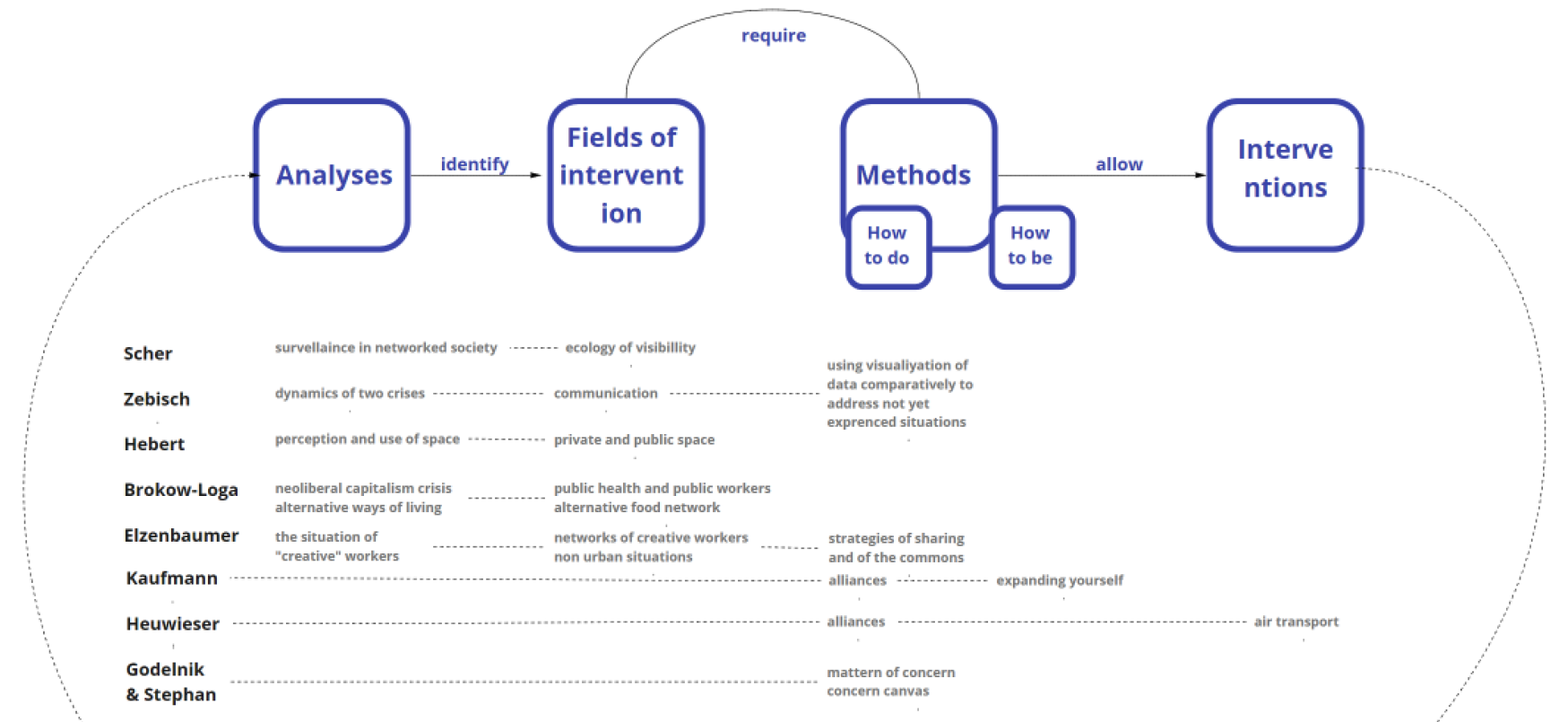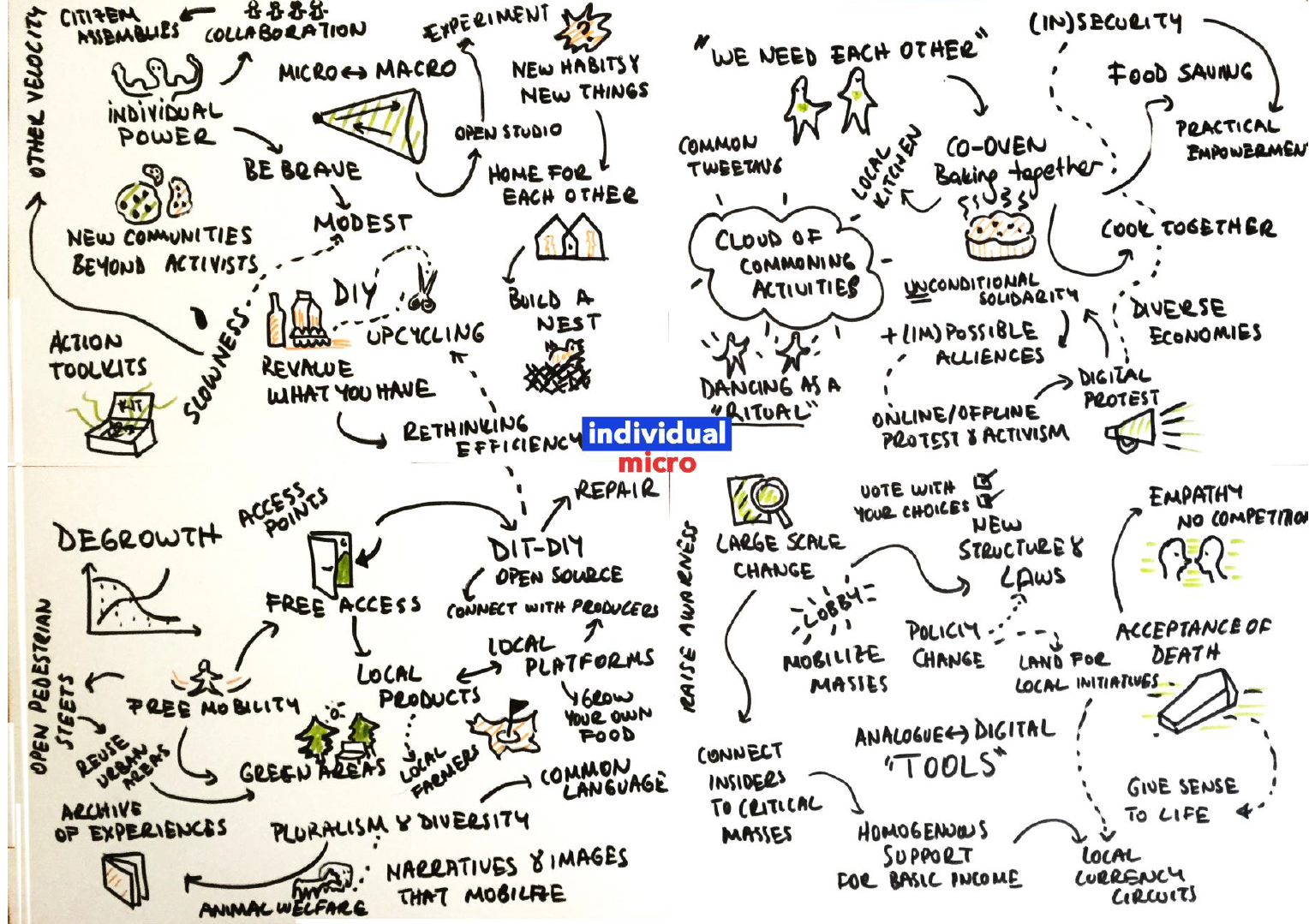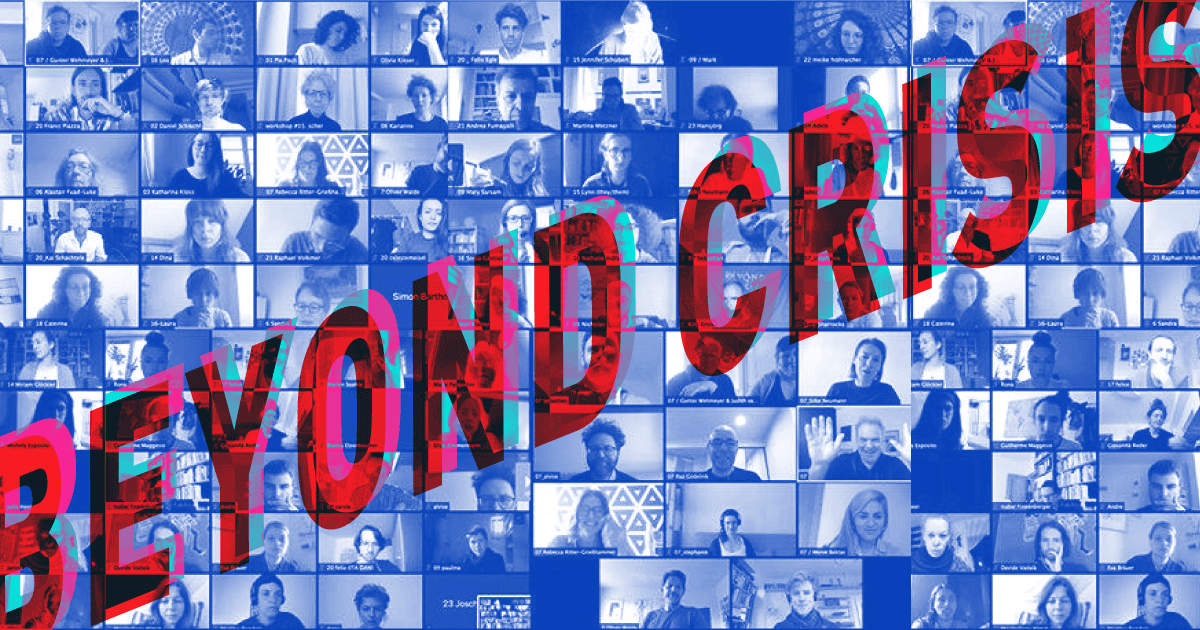Saskia Hebert called it a „social un-distancing-experience“, and yes, in fact, we experience the conference as a vibrant, empowering and productive coming together – not only as an interesting set of topics and talks. This was only possible through the collaboration of many people (see more here under Danke! Grazie! Thank you!). On this page, we put together traces, material, outcomes and possible next steps. This is quite a bit of work and will be done step by step, also with your help. If you participated in the conference and you find something is missing or can be improved on this page, please let us know. There are many diverse and complementary threads and outcomes, but on unites all:
No back to business-as-usual. Let’s create momentum for the transformation towards just and solidary modes of production and living that are nourishing ecological livelihoods in free societies now!
Next steps:
- Setup a channel of communication and collaboration. Possibly mattermost (like slack, but open source and privacy/security-friendly, easy to use with apps for all platforms)
- Continue collaborating in working groups (see workshops below)
- Meet again for interweaving the threads at other events, eg. local: ideensalon; international: degrowth Vienna 31 Mai – 1 June) and at By Design or by Disaster 1 – 4 Oct 2020 (DoD20). Other?
- Eventually, organise another Beyond Crisis Conference in June/Juli or do monthly online Beyond Crisis meetup” until we see us for DoD20 in October in Bolzano-Bozen with online inserts.
Other ideas? If you participated in the conference, please answer the survey sent to you via email, and/or use the pad Milena setup.
Connecting the dots …
… across all inputs of Friday by Alvise Mattozzi (Researcher in Sociology, Semiotics & STS, teaching Social Studies of Design in the MA Eco-Social Design).

… among all the workshops by Alastair Fuad-Luke (Prof. for Design Research, MA Eco-Social Design).

Materials & traces from the inputs
- Julia Scher, Academy of Media Arts No materials yet
- Sina Kamala Kaufmann, science fiction author / Extinction Rebellion.de: European Dream No materials yet
- Magdalena Heuwieser, co-founder of the global network Stay Grounded: A just transition in the transport sector: Civil society strategies countering aviation bailouts
Current campaign: #SavePeopleNotPlanes: Red Lines for Aviation Bailouts - Marc Zebisch, EURAC Institute for Earth Observation: The Climate Crisis is COVID-19 in slow motion. So what can we learn? Slides (.ppt)
- Raz Godelnik, Parsons & Peter Friedrich Stephan, Academy of Media Arts: Will the real transformation designer stand up,please? Slides
- Saskia Hebert, MA Transformationsdesign / subsolar: Housing the crisis Slides & Video (accessible only for the participants of the conference; user: BEYOND-CRISIS, PW: see email)
- Anton Brokow-Loga, ILA Kollektiv: The ‘Corona Crisis’ as a Take-Off Point for Transformations towards a Solidary Mode of Living? Video & Script (PDF)
- Bianca Elzenbaumer, Brave New Alps / Marie Sklodowska-Curie Fellow at Eurac Research: Practising the future together – getting going here and now Methods & References
Outcomes from the workshops
“How to use the virus-induced situation to build up momentum for social-ecological “transformation?” was the central question, which was tackled in diverse thematic threads. The workshops used various methods and modes of working together, but all of them used a visual board and generated 3 actions, which were shared in the final session. Some groups will continue to collaborate. You are encouraged to approach the groups of your interest. Contribute what you can. Get what you need.
If you have been part of a workshop, and you would like to add information, links, contacts, materials, etc on this page, please let us know. The embedded boards are big. Go full screen. Use your mouse and the mouse when to explore them.
Learning from the crisis
Power Relations in and beyond the Crisis
3 actions: good ideas, but not formulated in 3 concise actions. Better navigate the board.
Visual Notes: Daniel Schiechl
Corona crisis / Climate crisis — learnings?
3 actions: good ideas, but not formulated in 3 concise actions. Better navigate the board.
Visual Notes: Katharina Kloss
New desires, new priorities – what really matters
3 actions: What matters to YOU? Look inwards:
- Embrace new habits and the little things you experience about yourself. Be modest and decide what you want to nurture in the future – and give it space!
- Build a nest inside your house, equip yourself with the things you really need.
- Be brave and allow yourself to think big and visionary.
Visual Notes: Adele Buffa
Alternative Production / Rediscovering the pleasures of analogue
3 actions: give time back its “old” value:
- get back to the hand-writing roots
- be creative with artifacts you have at home
- Exchange resources
Visual Notes: Janine Vorfeld
Strategic Thinking & Positioning
Reboot: Going beyond system malfunction
By Alastair Fuad-Luke / Unibz
Three actions (micro/meso/macro) to reboot the system:
- Micro: share action toolkits
Share resources (skills, references, insights) that can be activated by others.
A toolkit for action that encourages encountering difference and cherishing it as a driving force to create new forms of co-existence - Meso: practice forms of civic engagement as a path for emancipation
to rebalance the intensities and priorities of free time, caring time and working time in order to be able to engage in collective care of socio-ecological structures. - Macro: unleash a semiotic shift: reboot language and imagination
develop and share emancipatory narratives and imaginaries. Contribute to a massive ontological change that reconnects all species in an interdependent planetary existence.
Sildes (PDF)
Visual Notes: Cristina Dalla Torre
Will the real transformation designer stand up, please?
By Raz Godelnik / Parsons School of Design – The New School & Peter Friedrich Stephan, Academy of Media Arts
3 actions:
- (WHO/Collaboration) Building Team TD (Transformation Designers) -> Interdisciplinary approach (using tools like concerncanvas, iceberg model, etc.) + engage with people around the tools (concerns, mental models)
- (Communication/storytelling) Establish a platform, which will allow for learning from existing examples of successful TD – show projects, success stories, how do we use methods effectively..
- (Experimentation) Office of change! Open studio where people can experiment with TD and engage with processes (maybe one in every city/university?) -> increasing visibility of TD (reframing the term? Trustformation? – going back to the idea of existential moment..) -> Context: VUCA world!
Slides. Message from Raz: “In terms of continuing the work and in the spirit of the actions we discussed in our workshop I think it would be great if we can work on ideas for concrete projects based on the outcomes of the conference to enable local-based and collaborative design work on the issues discussed at the conference. Maybe creating a crowdsourced structure similar to ideo.org? It I would love to find ways to keep the momentum going and involve more stakeholders, including students and others to experiment and test potential directions discussed in the conference.”
Visual Notes: Merve Bektas
A collection of tools for Transformation Design by Peter Friedrich Stephan; Sustainability-as-unusual tools and frameworks and the DEFT framework by Raz Godelnik; Corona Redesign – A Pre-Manifesto by Godelnik & Stephan.
Cities beyond Growth: Urban Struggles as Points of Leverage for Solidary Re-Localization
By Anton Brokow-Loga / ILA Kollektiv, Bauhaus University Weimar
3 actions:
- Don’t undo! Keep pushing back growth-centered urban design
- Do! Making solidary alternatives visible and accessible for all
- Continue! Protecting and institutionalizing approaches of urban degrowth
Slide (PDF)
And a lot more, including very concrete measures > explore the board!
Visual Notes: Carola Kurz
Strengthening and forming alliances
To identify, bridge and create alliances it is useful to see what is already there. We propose to create an open database/platform to map transformative actors, making connections visible around concerns.
- Continue mapping collectively & prepare an online tool for it as an open development group
- Invite conference group & other change-makers to contribute their knowledge on actors and alliances
- Identify bridging actors and concerns & act on them!
Next meeting: 28 Apr 2020, 17:00–19:00 (CEST / UTC+2h). Please write us to join.
Milena Blandon, Maximiliane Wittek / Humans For Future, Hannah B. / netzwerk-n.org, Kris Krois / designdisaster.unibz.it. Collaborators welcome > send an email. Needed: competence in web development & design
Visual Notes: Vanessa Deotto
Science, Politics, Citizens – effective cooperation
- Access points: A regular meetup lunch
- Citizen assemblies: A local monthly meetup between scientists, citizens and politicians
- A common language (simple but deep): Inclusive language. Simplify complex, industry-jargon into information or language that is accessible
Visual Notes: Iske Conradie
Framings, images and narratives for transformation
communication: creating new signs, symbols and languages to overcome old patterns and behaviour (such as schools, social media, press …). creating simple metaphors for complex contexts to use familiar narratives for framings to connect and bridge with people – listening to each other. bodying is a political element – tensional responsiveness (interdependencies of networks and connections). narratives away from heroes. perhaps even a crisis Identity?
- imaginative thinking: foster imaginative thinking to outline solutions on diverse levels. teach individuals, institutions and society to create future perspectives behind the challenges to overcome; creating and envisioning future images (common utopias) by a multi-diverse commission
- communicate COVID learnings: seeing the current crisis situation as a learning opportunity and campaigning for the “analogies of covid 19 and climate crisis” to find new narratives, foster a radical shift and increase awareness for interconnectivity
- learnings from COVID crisis: individual and therefore collective behavior matters and influences the overall situation; we have to anticipate risk and radically act now to reduce the delayed impact; chance to reflect on what’s relevant to us individually and the “system” – system-relevance; developing the temporary infrastructures and new gained social bonds originated by the crisis into sustainable ones; using collaborative tools and open source for collaborative problem solving
Visual Notes: Corinna Sy
Agendas for action – Things to fight for and against
Diverse Economies Resource Fund
By Bianca Elzenbaumer / Brave New Alps / Marie Sklodowska-Curie Fellow / Eurac Research, Martina Dandolo / Magari and Flora Mammana / La Foresta
3 elegant actions
- The Diverse Economies Resource Fund exists to support eco-social practitioners in tangible and intangible ways. And if you want you can contribute 50€ to create an initial pot of money.
- We meet again online on 1 May at 10:00 -12:00. Tell people it exists and invite more to join. Send us your e-mail if you want to join us: bravenewalps@gmail.com, martinadandolo@gmail.com, mammanaflora@gmail.com
- Keep the flow of energy and keep dancing as a ritual. Send us a dance video :)
We are excited about the process that we have been able to start during the workshop to bring The Diverse Economies Resource Fund into existence to support eco-social practitioners in manifold ways. We decided to invite more eco-social practitioners to join (they do not need to be designers) and for that reason, we extend the invitation to everyone to see each other again for the next online meeting on 1 May at 10:00-12:00 (CET). Please send us an email to get the zoom link.
Preparation: this is the board that we have compiled during the workshop, we would like you to spend a few minutes before the next meeting, to reflect and observe our process. You are all invited to add your thoughts, and reflections and of course you can continue to add resources. What is it you would need or could contribute to make eco-social practice thrive?
Spread the word and again remember to keep the flow of energy and keep dancing as a ritual. Send us a dance video :)
Visual Notes: workshop initiators
With many eco-social designers already hit by the economic recession provoked by the lockdown, we want to figure out how not to panic. During the workshop we will explore how to get organised in solidarity networks in order to be able to use this rupture created by Covid-19 to propel actions for socio-ecological transformations.
Control & surveillance
By Julia Scher / KHM Cologne and Jennifer Schubert / Unibz
3 actions:
- Funkloch areas (Controlled – uncontrolled space?)
- Protect & protest against power sets (?)
- Prototype offline-Activisms with digital tools in this moment.
Slides (PDF)
Visual Notes: Andrea Gaidano
A just green new deal
By Sonia Gantioler, Eurac Research
3 actions:
- Individual/micro: new awareness: emphasize the positive changes towards a greener world that took place in that times of crisis and foster the urge of action to keep them going
- collective/meso: new values: (re-)discover techniques and values, focus on locality and cooperation (e.g. sustainable agriculture, home-grown food etc.) (e.g. empty streets, digital education, individual movement)
new space: (re-)discover spaces and expand property rights (e.g. use of streets and roofs) - institutional/macro: new structures: Strengthen the (environmental) justice system, establish structures that represent the rights of nature & ensure the ethical & environmental standards for companies
Visual Notes: Laura Heym
Commoning, subsistence & sufficiency
3 actions
- CO–OVEN: Shared community oven where food, ingredients, recipes, products, skills can be shared (sourdough as an icon); shared space, community and gatherings are created
- CO–OVEN 19: let’s spread a positive virus. create social platform for CO-OVEN to increase visibility and reach more people (e.g. website, organise pizza festival, go to other festivals with CO-OVEN and make pizza); share knowledge, offer educational courses (e.g. how to make your own sourdough); create timetables for when and where people meet (could be a smartphone app); social network
- CLOUD OF COMMONING: Start a supportive, decentralized network of different initiatives (e.g. bike kitchen; food saving); connect different types of service; build alliances; exchange experience, knowledge & resources; Digital and physical (e.g. open source online platform; open map of commoning projects; physical infrastructures & tools)
Visual Notes: Giulia Fasoli
Post-growth
3 actions: good ideas, but not formulated in 3 concise actions. Better navigate the board.
contact: Caterina Laruccia
Visual Notes: Caterina Laruccia
Working with care & resilience
3 actions: good ideas, but not formulated in 3 concise actions. Better navigate the board.
Visual Notes: Rendy Anoh
Emancipatory digitalization
By Felix Egle
3 actions: good ideas, but not formulated in 3 concise actions. Better navigate the board.
Visual Notes: Celeste Meisel
Digital tools to organise and inform play a crucial role in the COVID 19 crisis. From pop-ups on most popular media outlets to homeschooling and teams that can continue to cooperate over distance, we experience a massive shift to the digital realm of social and professional practices. In the session, we have the chance to exchange on the emancipatory potential of technology from our individual perspectives and try to distil potential for further action and development. Can we empower ourselves from within? And if yes, how specifically?
Universal basic income & welfare
- European Level: Have a homogenized Basic Income in each EU country. Instead of pumping the money into „the economy“ via the banks, which seem not to be able to make the money get to the ones, who really need it, the should ECB finance a European Universal Income. Them people “invest” in economies according to their needs. Campaign: “Emergency basic income for the EU – now!”; Background: “New Report: Helicopter money as a response to the COVID-19 recession”
- National Level: Fiscal reforms to better organise public expenditure. (e.g.: convert military expenditure into social expenditure)
- Municipality Level: local currency circuit, e.g.: Bristol Pound (UK) / Sardex (IT)
Visual Notes: Maria Pasqualini
The Covid-19 health emergency can be an opportunity, in the tragedy, to experiment new forms of welfare policies more adequate to the collective needs. The first node is how to guarantee income stability during the lock-down of most productive activity. What do we mean about basic income, which kind of relationship with labour activity, how can it be financed?
Post-corona South Tyrol
3 actions:
Assumptions: Interest in local supply and high quality food rised through crisis; job losses through crisis; value of product increases as soon as processed
- Policy change: demand policy through contact with politicians (and technicians) to lobby for distribution of land for local initiatives like this we can achieve space for local growing initiatives
- Local initiative “Local Kitchen”: Production of surplus in Orto Semirurali community garden (Bolzano) and Pop-up kitchen 1x week “selling” (donation-based) fruit/vegetable produce and dishes (using locally produced ingredients and bring-your- own-box takeaway ) grown & prepared by post-corona economically challenged members of the orto semirurali community
- Provide and promote: use local newspapers, facebook groups, whatsapp groups to spread idea develop digital support (e. g. App) that supports and encourages potential new cultivators to give more confidence (watering plants, how-to FAQ)
Visual Notes: Meike Hollnaicher
The current thesis project-in-progress by Julia Reindl fits perfectly to this: “We Build Our Future Now” is a Bolzano-based initiative that launched the idea of the #windowstories: Are you inspired to re-imagine the view from your window for a positive change? If you want to participate, upload a photo and share your vision with us. More information: instagram.com/webuildourfuturenow
Rethinking food systems
3 actions: good ideas, but not formulated in 3 concise actions. Better navigate the board.
Visual Notes: Shiri Mahler
If you participated in the conference and you find something is missing or can be improved on this page, please let us know.
